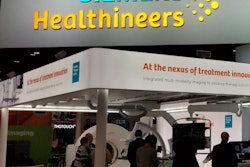Dear MRI Insider,
Imaging technologies for use at the point of care can offer significant value for patients who are in too fragile a condition for transport. To that end, researchers at the Massachusetts Institute of Technology are developing a portable, lightweight, whole-brain MR scanner.
In addition to its clinical benefits, the low-field, helmet-like device also could potentially avoid the large-scale financial investment and structural requirements needed to purchase and site conventional, long-bore, 1.5- and 3-tesla MRI systems. But what kind of images will such a scanner produce? The details are available in this edition's Insider Exclusive.
A new retrospective, longitudinal study from the University at Buffalo is adding to the growing research on gadolinium-based contrast agents (GBCAs). Although the researchers found evidence of gadolinium accumulation in the brains of multiple sclerosis (MS) patients after MRI scans with a linear GBCA, they did not observe any worsening of the MS patients' conditions at five-year follow-up.
Clinicians naturally take particular precautions when a patient with an implanted cardiac rhythm management device is scheduled for an MRI scan. Austrian researchers have determined the minimum magnet strength at which clinicians can image these patients and still achieve diagnostic-quality results.
In addition, Swiss and German researchers have devised an effective diagnostic cardiac MRI workup strategy that has quadrupled the rate of myocarditis detection in patients with myocardial infarction and nonobstructive coronary artery disease. Their redesigned approach uses cardiac MRI to examine all unexplained cases of myocardial infarction and nonobstructive coronary artery disease and employs strategic MRI protocols during the scans.
Because more than 90% of ductal carcinoma in situ (DCIS) lesions are clinically asymptomatic, appropriate management options must rely on accurate assessments for these patients. In these situations, preoperative breast MRI improves the surgical planning and outcomes and offers clinicians a valuable tool for treating women with pure DCIS diagnosed by core-needle biopsy.
Be sure to stay in touch with the MRI Community on AuntMinnie.com for coverage of news and research developments around the globe.



.fFmgij6Hin.png?auto=compress%2Cformat&fit=crop&h=100&q=70&w=100)




.fFmgij6Hin.png?auto=compress%2Cformat&fit=crop&h=167&q=70&w=250)











